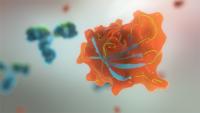Hailed as the biggest breakthrough in cancer treatment since chemotherapy, immunotherapy that blocks the PD-1/ PD-L1 checkpoint is set to be worth $30 billion by 2020 (link is external). With promising patient responses seen in the treatment of cancers as varied as lung, renal, bladder, breast, melanoma, and the suggestion of positive responses in penile cancer, PD-1/PD-L1 inhibitors really do appear to offer a game-changing therapy across a panoply of cancer types.

Avacta recently revealed positive results from the initial pre-clinical in vivo studies using Affimer PD-L1 inhibitors engineered as Fc fusion proteins. Anti-PD-L1 Affimer® proteins specific to either the human or mouse versions of PD-L1 were both very well tolerated at clinically relevant doses with no adverse effects seen. Also, both the anti-human PD-L1 and anti-murine PD-L1 Affimer inhibitors showed pharmacokinetics of good in-serum half-lives in the mouse models, reducing the need for repetitive injections to reach a therapeutically relevant concentration. In a separate study using Affimer inhibitors specific to the murine PD-L1 protein, the inhibitors were able to significantly reduce tumour growth in a syngeneic mouse model, demonstrating their bioavailability and functionality as therapeutic molecules.
The purpose of the PD-1/PD-L1 immune checkpoint is to prevent the immune system attacking our own cells and leading to autoimmune diseases. Discovering that cancer cells use our own immune checkpoints to evade attack provided a leap forward in targeting these tumours. PD-1 on the surface of T cells interacts with PD-L1 on the tumour surface to quell the immune response. Blocking this checkpoint with PD-1 or PD-L1 inhibitors awakens the immune system to the presence of cancer cells.
Within the clinic inhibitors of PD-1 and PD-L1 are showing remarkable results. This form of immunotherapy appears to shrink tumours in a higher number of patients across a wider range of tumour types and is associated with lower toxicity levels than other immunotherapies. Although many of the trials are fairly recent one of the most notable features of immune checkpoint inhibition appears to be the durability of the patient response (link is external), with patients living much longer than with other standard cancer treatments, such as chemotherapy. Responses are so good that nivolumab, a monoclonal therapy that targets this checkpoint, is now being considered as a first line treatment over chemotherapy approaches in response to newly diagnosed non-small cell lung cancer.
Our unique high throughput platform (link is external) was used to identify and characterise a panel of PD-L1 inhibitors as potential biotherapeutics. The best candidates were progressed to engineering their format for optimum performance, this included the analysis of multimers and addition of the Fc portion to the Affimer molecules to improve serum retention. The latest results show that Affimer binders offer good half-lives, no adverse effects and are functionally active in vivo. A key advantage of Affimer technology is the speed of development; from the initial screening process for the Affimer binders to their evaluation in in vivo models progression was rapid, giving the potential for reduced development costs.